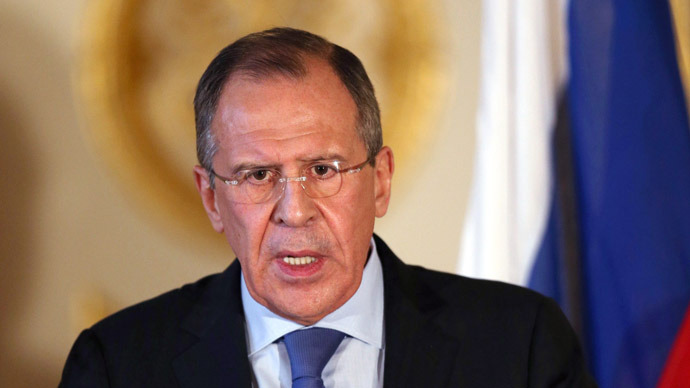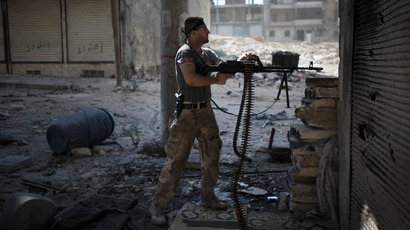Arab League decision to recognize Syrian rebels denies peaceful solution – Lavrov

The Arab League’s recognition of the Syrian opposition as the legitimate representative of the Syrian people means that the League is refusing to allow a peaceful settlement in Syria, Russian Foreign Minister Sergey Lavrov said.
“We have learned the results of the Arab League summit in Doha with regret, I can tell you frankly,” Lavrov said at a media briefing on Thursday.
“We consider the main meaning of the decisions made that the Arab League has refused a peaceful settlement for Syria.”
“The recognition of the national coalition as the only legitimate representative of the Syrian people contradicts the Geneva [Communique],” Lavrov argued.
In the wake of the decisions made at the Arab League’s summit, Moscow does not see how the UN-Arab League peace envoy for Syria Lakhdar Brahimi is going to perform his duties, Lavrov said.
Lavrov said that one “big question” is emerging concerning Brahimi’s UN-Arab League mandate: If one of the founders of the mandate, the Arab League, proclaims that the national opposition coalition in Syria is the only legitimate power, “there will be no negotiations, only arming of the forces set to oust the regime.”
“I simply cannot see how Mr Brahimi could still be considered
not only the UN mediator [for Syria], but for the Arab League as
well,” Lavrov said.
As for decision to supply arms to the Syrian opposition, this decision does not only violates international law, but “is an encouragement of confrontation of the irreconcilable forces on both sides to make them fight this war to the bitter end,” Lavrov said.
On Tuesday, a two-day Arab League annual summit kicked off in the Qatari capital of Doha. Receiving a round of applause, a delegation of Syria's opposition National Coalition entered the hall and took the country's official seat at the gathering.
The chair had remained vacant for some time as the League suspended the Arab republic’s membership in the organization back in November 2011 – as punishment for President Bashar Assad’s government crackdown on protests.
The leader of the delegation - the head of the Coalition Ahmed Moaz Khatib - called on “friends and brothers” for support in granting the opposition a seat at the United Nations as well as other international organizations.
Khatib – who had earlier said he wanted to resign as the head of the coalition - also used the forum to urge Arab leaders to beef up assistance to the Syrian opposition, including the provision of military aid.
The Arab League agreed that member-states had the right to provide military support to Syrian rebels.
Moscow called the decisions made at the summit “unlawful and indefensible.” The country maintains that the only solution to the Syrian bloodshed that has been going on for two years is a political dialogue with all parties of the conflict involved.
Meanwhile, the EU foreign policy chief, Catherine Ashton “saluted the vision and leadership of Khatib.”
“On several occasions, she welcomed Mr Khatib's courageous efforts to engage with representatives of the Syrian regime and launch a dialogue leading to a peaceful resolution of the conflict,” her spokesperson said in a statement on Thursday.
On Wednesday, Syrian President Assad addressed leaders of the BRICS states – Brazil, Russia, India, China and South Africa – with a letter, to help halt the conflict in his country. The group of five emerging powers “has become a hope for our oppressed peoples that suffer from blatant foreign interference in their affairs against their interests,” Assad’s message read as cited by state-run Syrian SANA agency.














